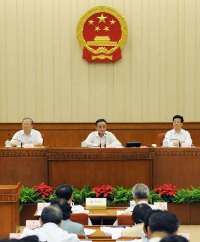End of an Era: China Wipes Crime of Speculation from the Books
 China's top legislature is considerring removing outdated laws relating to speculation and the crime of speculation, a throwback to the days of China's planned economy, from the country's law books.
China's top legislature is considerring removing outdated laws relating to speculation and the crime of speculation, a throwback to the days of China's planned economy, from the country's law books.
According to a draft resolution sent to the standing committee of the National People's Congress (NPC) on August 24, regulations covering speculation and the crime of speculation still remain on the books in four areas of Chinese legislation; meteorology, wildlife protection, railway law and regulations related to the country's tobacco monopoly.
The crime of speculation or 投机倒把 (tóujīdǎobǎ) entered China's criminal law at a time when the planned economy dominated the country.
At that time all commodities were priced and allocated by the government.
However, some people were able to take advantage of their positions and get their hands on much-sort-after commodities through back-door dealings, and then to sell them on at at profit. These commodities usually passed through many hands before reaching their final consumer at a much higher price.
With that in mind, China's top legislature and state council enacted a series of laws and regulations to crack down on such speculative activities.  In 1979, China enacted its first criminal law, classifying such speculation as a crime. Five years after that, the country's top legislature made the maximum sentence for this crime the death penalty.
In 1979, China enacted its first criminal law, classifying such speculation as a crime. Five years after that, the country's top legislature made the maximum sentence for this crime the death penalty.
In 1987, the state council formulated a provisional regulation, which clearly listed 11 categories of speculation activities.
From 1983 to 1991, many people were put into prison and even sentenced to death for the crime of speculation.
One of the best known cases of an individual being sentenced to death for speculation took place in Wenzhou, Zhejiang province. An unemployed woman by the name of Zheng Lefen was charged with the crime of speculation because she appropriated 62 million yuan of private deposits while carrying out fund-raising activity in 1986. Zheng was sentenced to death in 1991.
However, as China's economy became more market-oriented in the 1980s, some speculative activities that had originally been proscribed by the government were made legal.
In 1997, the country's top legislature erased the crime of speculation from the criminal law in 1997.
The State Council also abolished the provisional regulation on speculation in early 2008.
This latest move to rid the remaining areas of China's legal system of this antiquated law, is part of a wider campaign to rid China's legal system of outdated regulations being undertaken by the standing committee of the National People's Congress.
Links and Sources
National People's Congress: Article (Chinese)
Hudong.com: Image
The views posted here belong to the commentor, and are not representative of the Economic Observer |
Related Stories
Popular
Briefs
- OPhones to Take on iPhone
- The 3G-enabled Lenovo Mobile OPhone is likely to provide stiff competition to Apple's iPhone in the China market.

- Source:China Mobile
- 6.4-Magnitude Quake Rocks West China
- A 6.4-magnitude earthquake struck China's western Qinghai province earlier this morning.
- Source:China Earthquake Networks Center

- TAX
- Taxing Times
- China's tax bureau aims to collect an additional 100 billion in tax before the end of the ...




















